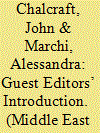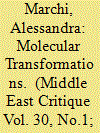|
|
|
Sort Order |
|
|
|
Items / Page
|
|
|
|
|
|
|
| Srl | Item |
| 1 |
ID:
178137


|
|
|
|
|
| Summary/Abstract |
This Special Issue is based on an academic collaboration going back to a conference held at the Università degli Studi di Bari in Italy, on 30 November and 1 December 2017, and entitled ‘Gramsci in the Arab World.’ The conference organizers were Gennaro Gervasio, Patrizia Manduchi and Alessandra Marchi in collaboration with the Centro Interuniversitario di Ricerca per gli Studi Gramsciani, the Gramsci Foundation of Italy, the GramsciLab at the University of Cagliari, and the International Gramsci Society (IGS). It marked the 80th anniversary of Antonio Gramsci’s death. The longest period of Gramsci’s incarceration (June 1928–November 1933) was in Turi, a prison not far from the conference site. Delegates were able to view a selection of Gramsci’s actual prison notebooks, which his sister-in-law, Tatiana Schucht (d. 1943), successfully saved from prison. These provided us a vivid encounter with the traces and intellectual results of struggles from an Italian and European past, an encounter that underlined connections with a Middle East and North Africa beset with political incarceration, problems of revolutionary leadership, counter-revolution, proto-fascism, state violence, colonisation, socioeconomic crisis, and right wing populism.
|
|
|
|
|
|
|
|
|
|
|
|
|
|
|
|
| 2 |
ID:
178142


|
|
|
|
|
| Summary/Abstract |
The increasing interest in Antonio Gramsci’s thought constitutes an important source of inspiration in the study of the Middle East and North Africa, particularly in the post-2011 Arab uprisings period. The popularity of the Italian Marxist thinker is to be found in the original applications and uses of Gramscian categories, which have given rise to a growing secondary literature, especially outside Italy and Europe, beyond Gramsci’s immediate background and beyond the context of his own historical and political analysis. The revolutionary moment of 2011, the crisis of hegemony, and thus the crisis of ‘the State as a whole’ (stato integrale), is present in different ways in Arab countries, where many groups within civil society live, work, compete and protest tirelessly. This article draws attention to the less explored Gramscian concept of the “molecular” and argues for the importance of reading molecular, even fragmented, ways to resist the manufacturing of consent and the dominant hegemony during revolutionary moments, such as the pre- and post-2011 periods. The concept of the ‘molecular’ (molecolare) is fundamental to shedding light on the potentially transformative implications of everyday contentious actions and helps us to scrutinise what kind of hegemony is possible in Arab-Mediterranean countries today. Furthermore, Gramsci enables us to confront multiple, singular experiences of ‘others’ – which already are shaping contemporary history in different world regions while being intertwined with global history. This article shows how the theoretical, methodological and political potential of Gramscian interpretations is vital to – and can be enriched and renewed by – a promising, ongoing interdisciplinary dialogue.
|
|
|
|
|
|
|
|
|
|
|
|
|
|
|
|
|
|
|
|
|